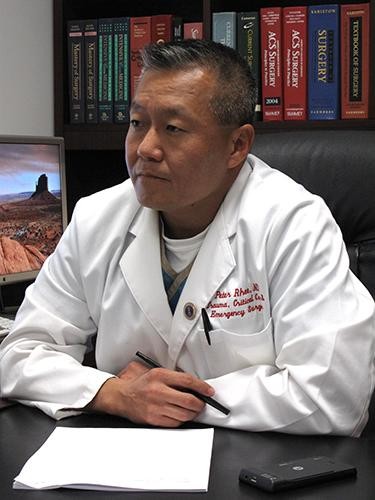Dr. Peter Rhee, medical director of Trauma and Critical Care at University Medical Center and professor of surgery at the UA College of Medicine
Daily Wildcat: In the context of your work, what has the past week and a half been like compared to an average week?
Rhee: I think the media we’ve gotten is not average. It’s a little unusual. However, I think the volume of the work we do and the type of work we do has not been much different from the work we do all the time.
DW: What has it been like, as someone who’s practiced medicine for many years, to be suddenly thrust into the spotlight as a prominent figure in the media?
Rhee: Well, I don’t know if I’m a national figure, so I’ll have to take your word for it. But, I haven’t been watching the news and I haven’t been watching the TV or things like that, so I don’t really know what impact that’s having. I’ve been working here like we normally do. I do know that when I traveled to San Diego, people started recognizing me, which was a little disturbing. Because you’ve got to understand, when you have fame in medicine, you’re not doing yourself any favors.
DW: Were there any challenges medically with the victims of the shootings that you haven’t seen before?
Rhee: Individually, it was all very routine for us and something we take care of all the time. On Sunday, I was on-call and had a lady who was shot in the head and survived as well. This is something that does go on all the time. We just don’t get celebrities all the time as patients.
DW: Have there been challenges balancing caring for patients with communicating information through press conferences and media requests?
Rhee: It has been extremely disruptive to me and my schedule, but my partners who work with me have been covering as much as they can. But it has been very disruptive. Right now, I should be in the clinic and caring for patients and so on. We’re trying to appease the public as best we can, and we’re trying to make it so everyone gets something positive out of this. It has been very difficult from this aspect.
DW: Have you had difficulties communicating patient conditions to the media and other people who may be not be familiar with medicine?
Rhee: I think the media has been very gracious to us and very cooperative. It’s been a pleasure in many ways to work with them. I don’t think it’s been difficult as far as I’m concerned at all. They’re trying to get a story, and I understand that, but I’ve also worked with media before. I’m used to trying to explain things so that the layman can understand it. So, I would say, overall, it’s been a very positive experience.
DW: How has your background with practicing medicine in the military helped prepare you for what you do now?
Rhee: I went to college at Georgia Tech, and when I went to medical school, I went to the military medical school. It’s like their academy for medicine. I did that, obviously, because I needed the financial aid that they were going to support me with. But my brother’s a retired colonel in the Marine Corps, and because of that, I’ve always been interested in going into the battlefield and doing trauma. I’ve been preparing for that my entire life. I spent 24 years doing active duty and just retired from the Navy three-and-a-half years ago. So this is basically what I’ve been training for my entire life.
DW: I know you’re also a professor in the College of Medicine. Has this event had any affect on the semester?
Rhee: Our teachings are from a clinical standpoint. From a medical standpoint, we’re 24/7, 365. People get hurt whether it’s a holiday or the weekend. This is something that we do. We don’t really focus on our teachings much based on the semester-type situation. We hope it’s business as usual, and students are getting as much as they normally do and that this isn’t too disruptive for them. One thing that I hope, which is positive, is that the interest in the medicine and the interest in the surgery will improve. Because the marketing in medicine for a good decade has been pushing medical students into primary care, and there’s still a great need for people to go into specialties such as mine. So we’re always trying to recruit them as well.









